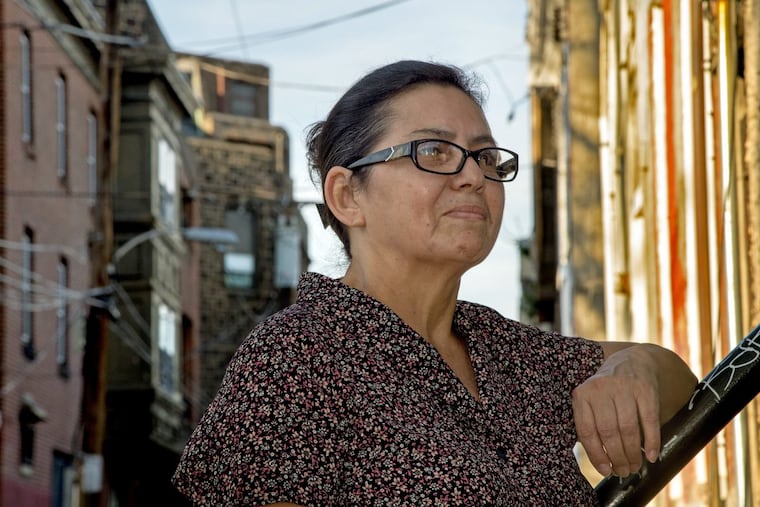For a Honduran mother in Philly, a forced return to a troubled homeland looms
Last week the Trump administration announced it would terminate Temporary Protective Status for Honduras, placing about 57,000 foreign nationals at risk of deportation. The special immigration status allows about 320,000 people from 10 countries to live and work here because of war, floods, droughts, or epidemics in their home nations.

The federal government says Miriam Turcios must go, leave behind her family, her job, her North Philadelphia house, and return to her troubled and dangerous homeland of Honduras.
She won't go easily, she says. Not after 24 years in the United States. She has faith in God and the future, she says, and believes Americans have caring hearts, even if their government can seem callous.
"We'll keep fighting because our family needs us," Turcios said in Spanish. "This is a country of immigrants. It made me sad somebody who has the education and power of the president does not recognize that."
Last week the Department of Homeland Security announced it would terminate Temporary Protected Status for Honduras, placing about 57,000 foreign nationals at risk of deportation. TPS, as it is known, is a special immigration status that allows about 320,000 people from 10 countries to live and work here because of war, floods, droughts, or epidemics in their home nations.
The status was never meant to be permanent when it was enacted by Congress in 1990. The government holds the power to designate a country for TPS, and to decide when conditions merit its cessation.
The Trump administration ended TPS for six nations in its first 16 months, part of its promised crackdown down on legal and illegal immigration. Losing status were Sudan, Nicaragua, Nepal, Haiti, and El Salvador, the last accounting for more TPS holders than any other country. Nationwide, Hondurans make up the second-largest group, although their community in Philadelphia is small — 3,386 people, concentrated northwest of Center City, census figures show.
The nearest TPS deadline is faced by the 1,270 Yemenis and Somalis living in America; their status is set to expire in September, with government decisions about possible extensions due in July, according to the National Immigration Forum in Washington.
Hondurans were driven here by Hurricane Mitch, which struck Central America in October 1998. It devastated Honduras and Nicaragua, killed more than 11,000, and left millions homeless. The U.S. granted TPS to Honduras three months later in 1999.
On Friday, in announcing the TSP termination, Secretary of Homeland Security Kirstjen Nielsen said Honduras has made substantial progress in its post-hurricane recovery. She allowed an 18-month window to provide for orderly returns, meaning people must leave the country by Jan. 5, 2020.
On Wednesday, an already-filed federal lawsuit seeking to protect Haitian and Salvadoran immigrants from losing TPS status was amended to include Hondurans. Brought by the Massachusetts-based Lawyers' Committee for Civil Rights and Justice, the suit argues that Trump's decisions on who must leave have been racially motivated.
The administration's swift moves to end nations' TPS status have angered those who support and welcome immigrants. Over time, the renewal of six- or 18-month extensions had become routine for some countries. As years passed, people put down roots, had children, bought houses, paid taxes, took out loans and mortgages.
That's what Turcios did.
At 61, she has a husband, a son and daughter-in-law, and two grandsons, 10 and 7, both American citizens by birth. She works as a seamstress, helping to support another grandson in Honduras.
What, Turcios wonders, remains for her in Honduras after more than two decades away?
"Our children, our grandchildren, have made their lives here," she said. "The separation of families is heartbreaking."
Turcios came to America in 1994. When Honduras was designated for TPS five years later, that offered a means for her to stay and work legally.
TPS's purpose is to give a country time to get back on its feet after war or disaster, accepting immigrants to take some pressure off the struggling nation. People who are already in the U.S. without legal status can step forward and be granted TPS, provided they pass background checks and prove they are citizens of the affected country, said lawyer John Vandenberg, head of the Philadelphia chapter of the American Immigration Lawyers Association.
Turcios stayed and built a life. She's a member of the immigration-activist group New Sanctuary Movement of Philadelphia, wanting to advocate for people who come here from many different lands.
Honduras is home to about nine million people — roughly the same as New Jersey — but more than half live in poverty, according to the CIA World Fact Book. It is one of the poorest countries in Latin America.
Immigration advocates say hurricane recovery has been slow, and sending people back is inhumane.
Honduras has one of the highest homicide rates in the world. Corruption in the police and judiciary is rampant, according to Human Rights Watch. The State Department has urged Americans to reconsider traveling to Honduras, saying violent crime including murder and armed robbery is common, and gang activity in extortion, rape, and narcotics- and human-trafficking is widespread.
Turcios hasn't yet figured out what she'll do if she's forced back to Honduras. The news is still too fresh.
"I came here looking for a better future," Turcios said. "Thanks to the U.S. — God bless America — I have a roof over my head. We're not doing anything wrong here. We're not hurting anyone. We're helping."
This article contains information from the Associated Press.